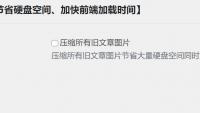【描述】
删除一个文章,附件,或者页面.
当在文章或页面使用这个函数的时候,所有依赖这个文章或页面的内容也将被删除。包括评论,自定义字段,和文章与类别的关系
【使用方法】
<?php wp_delete_post( $postid, $force_delete ); ?>【参数】
$postid
(整形)(可选) 文章 ID.
默认: 0
$force_delete
(布尔型) (可选) 是否绕过回收站箱直接删除 (在 WordPress 2.9 添加).
默认: false
返回值
混合型(mixed)
False on failure and a random wpdb object on success.
【例子】
删除文章:删除默认文章 “Hello World” 文章 ID 是 ‘1’.
<?php wp_delete_post(1); ?> 【源文件】wp_delete_post() 位于 wp-includes/post.php.
/**
* Trashes or deletes a post or page.
*
* When the post and page is permanently deleted, everything that is tied to it is deleted also.
* This includes comments, post meta fields, and terms associated with the post.
*
* The post or page is moved to trash instead of permanently deleted unless trash is
* disabled, item is already in the trash, or $force_delete is true.
*
* @since 1.0.0
* @uses do_action() on 'delete_post' before deletion unless post type is 'attachment'.
* @uses do_action() on 'deleted_post' after deletion unless post type is 'attachment'.
* @uses wp_delete_attachment() if post type is 'attachment'.
* @uses wp_trash_post() if item should be trashed.
*
* @param int $postid Post ID.
* @param bool $force_delete Whether to bypass trash and force deletion. Defaults to false.
* @return mixed False on failure
*/
function wp_delete_post( $postid = 0, $force_delete = false ) {
global $wpdb, $wp_rewrite;
if ( !$post = $wpdb->get_row($wpdb->prepare("SELECT * FROM $wpdb->posts WHERE ID = %d", $postid)) )
return $post;
if ( !$force_delete && ( $post->post_type == 'post' || $post->post_type == 'page') && get_post_status( $postid ) != 'trash' && EMPTY_TRASH_DAYS )
return wp_trash_post($postid);
if ( $post->post_type == 'attachment' )
return wp_delete_attachment( $postid, $force_delete );
do_action('before_delete_post', $postid);
delete_post_meta($postid,'_wp_trash_meta_status');
delete_post_meta($postid,'_wp_trash_meta_time');
wp_delete_object_term_relationships($postid, get_object_taxonomies($post->post_type));
$parent_data = array( 'post_parent' => $post->post_parent );
$parent_where = array( 'post_parent' => $postid );
if ( 'page' == $post->post_type) {
// if the page is defined in option page_on_front or post_for_posts,
// adjust the corresponding options
if ( get_option('page_on_front') == $postid ) {
update_option('show_on_front', 'posts');
delete_option('page_on_front');
}
if ( get_option('page_for_posts') == $postid ) {
delete_option('page_for_posts');
}
// Point children of this page to its parent, also clean the cache of affected children
$children_query = $wpdb->prepare("SELECT * FROM $wpdb->posts WHERE post_parent = %d AND post_type='page'", $postid);
$children = $wpdb->get_results($children_query);
$wpdb->update( $wpdb->posts, $parent_data, $parent_where array( 'post_type' => 'page' ) );
} else {
unstick_post($postid);
}
// Do raw query. wp_get_post_revisions() is filtered
$revision_ids = $wpdb->get_col( $wpdb->prepare( "SELECT ID FROM $wpdb->posts WHERE post_parent = %d AND post_type = 'revision'", $postid ) );
// Use wp_delete_post (via wp_delete_post_revision) again. Ensures any meta/misplaced data gets cleaned up.
foreach ( $revision_ids as $revision_id )
wp_delete_post_revision( $revision_id );
// Point all attachments to this post up one level
$wpdb->update( $wpdb->posts, $parent_data, $parent_where array( 'post_type' => 'attachment' ) );
$comment_ids = $wpdb->get_col( $wpdb->prepare( "SELECT comment_ID FROM $wpdb->comments WHERE comment_post_ID = %d", $postid ));
if ( ! empty($comment_ids) ) {
do_action( 'delete_comment', $comment_ids );
foreach ( $comment_ids as $comment_id )
wp_delete_comment( $comment_id, true );
do_action( 'deleted_comment', $comment_ids );
}
$post_meta_ids = $wpdb->get_col( $wpdb->prepare( "SELECT meta_id FROM $wpdb->postmeta WHERE post_id = %d ", $postid ));
if ( !empty($post_meta_ids) ) {
do_action( 'delete_postmeta', $post_meta_ids );
$in_post_meta_ids = "'" . implode("', '", $post_meta_ids) . "'";
$wpdb->query( "DELETE FROM $wpdb->postmeta WHERE meta_id IN($in_post_meta_ids)" );
do_action( 'deleted_postmeta', $post_meta_ids );
}
do_action( 'delete_post', $postid );
$wpdb->query( $wpdb->prepare( "DELETE FROM $wpdb->posts WHERE ID = %d", $postid ));
do_action( 'deleted_post', $postid );
if ( 'page' == $post->post_type ) {
clean_page_cache($postid);
foreach ( (array) $children as $child )
clean_page_cache($child->ID);
$wp_rewrite->flush_rules(false);
} else {
clean_post_cache($postid);
}
wp_clear_scheduled_hook('publish_future_post', array( $postid ) );
do_action('after_delete_post', $postid);
return $post;
}








